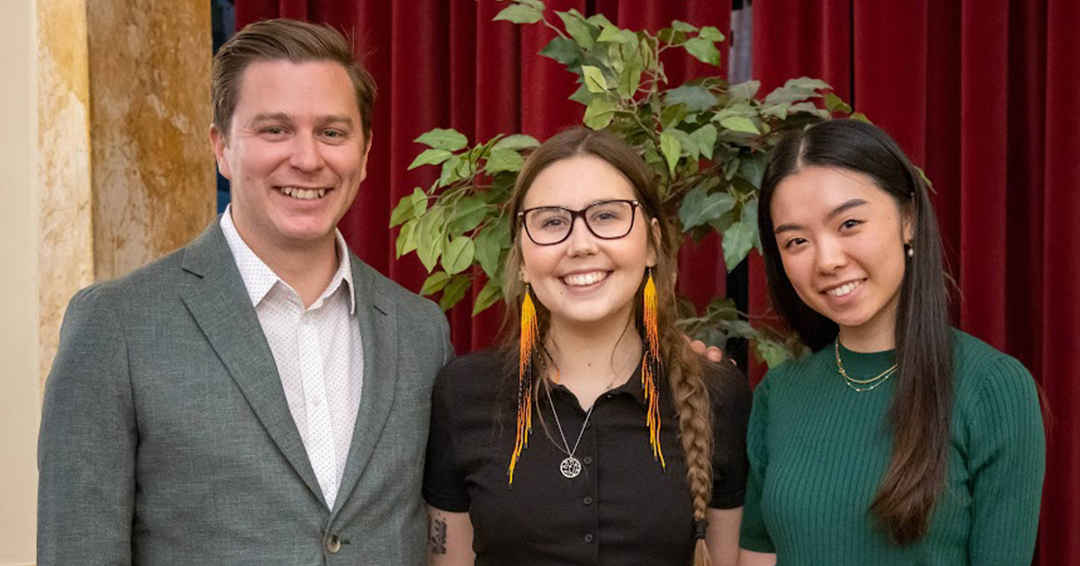
The product of a year-long advocacy effort by students and faculty members, McGill’s Faculty of Medicine and Health Science has added Indigenous World Views in Health Delivery and Research to its course catalogue. Beginning September 2023, the single semester course is open to graduate students in the School of Population and Global Health (SPGH).
The course was designed by Indigenous students and allies and will be led by Indigenous instructors. As stated in its syllabus, “All students are welcome and encouraged to partake in this course, but are expected to challenge themselves to think and learn outside of traditionally western or colonial ways of knowing and understanding approaches to public health research and practice.”
The role of Indigenous students in the development of the course is unique in university-level education in Canada. “It’s been student-led from the beginning,” says Sidney Leggett. Leggett, who is Métis from Manitoba and a McCall MacBain Scholar, is currently completing her MSc in Epidemiology and Biostatistics. “We felt there was a lack of knowledge that we were receiving from our degrees. In the planning and making of the syllabus, we worked alongside our Indigenous faculty members who helped us essentially, through the entire process.”
“Our students actually know better in how to enhance medical and public health education because we have more students who are coming from systemically marginalized communities,” says Ananya Banerjee, PhD, Assistant Professor in the Department of Epidemiology, Biostatistics and Occupational Health, and Equity, Diversity, Inclusion and Anti-Racism (EDIAR) Lead at the SPGH. “They have the lived experiences to pioneer and drive higher education in public health. The students were extremely pivotal for me in my role as EDIAR lead to shake things up and to make things happen.”
Course content includes: understanding the health of Indigenous peoples; Indigenous health research ethics and policies; and collecting, analyzing, and using public health data. The course will be taught through a combination of lectures, seminars, guest presentations and interactive discussions. Students will engage in group activities, reflections, case studies and a special activity related to Truth and Reconciliation Day.
“From our opening class, to the class about Truth and Reconciliation Day, to our closing class, we’re going to be focusing a lot on relationship building and incorporating ceremony into the teachings, so it’s not going to be a super classical lecture classroom space. It’s going to be highly interactive and we’re going to be bringing new faces in each week. We want to make sure that students feel connected,” Leggett notes.
According to Prof. Banerjee, the course will address the concerns over the years that students have had regarding equity issues, which largely arise from the absence of Indigenous worldviews and presence and understanding. “Our students felt very ill-prepared to go into the workforce to work with Indigenous communities as permitted allies, and can create more harm than good. I think what is really important in this work is to be able to foster and build really strong relationships with Indigenous faculty and students, and to do this work collectively. It really comes down to being very action-oriented and making transformational change within our institutions.
“This course is a huge game changer. It will ensure that our students have a very strong critical lens and that they’re aware whose land they’re on and what their role is. Most importantly, we hope to draw in more Indigenous students and faculty to our programs, because they need to see themselves in the programs,” Prof. Banerjee adds.
The next steps for the developers are to establish a three-credit course, which would be more in depth, and to offer more courses in the future. “Students are coming to decolonize, and we have to make sure that we have courses such as this one, which really showcases that we are actually committed to truth and reconciliation. And that really begins with education in public health and medicine,” Prof. Banerjee says.
“The foundational curriculum is geared toward students pursuing roles in public health, epidemiology, policy or healthcare,” says Josh Swain, who is also Métis from Manitoba and was part of the first cohort of McCall MacBain Scholars. “And then these people are going to go on and disseminate this knowledge and work the teachings into their policy making, ensuring that the knowledge gets built into the systems that they’re working in, in the future.”
“This course has really been an opportunity for a lot of the Indigenous faculty to come together, and do a little bit of community building for themselves as well,” notes Swain, who graduated with a Master’s degree in Science and Public Health from McGill last spring and is now working as a Special Project Manager at Anishnawbe Health Toronto.
Vivian Qiang, Student Policy Analyst at the Public Health Agency of Canada and MSc candidate, and Assistant Professor of Family Medicine, Alex M. McComber, also contributed to the development of the curriculum.
Related:
Meet the Grads, Spring 2023: Josh Swain, MSc in Public Health
Meet our new McCall MacBain Scholars: Yasmine Elmi, Sidney Leggett, Hannah Beddow and Bryden Bukich
